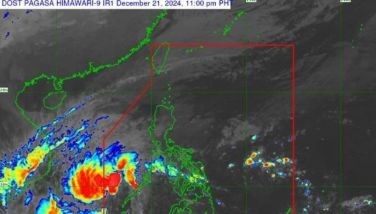DAR promotes education through scholarship drive
June 7, 2006 | 12:00am
The Department of Agrarian Reform and the National Commission on Indigenous People are working together to promote education in rural areas through a scholarship program.
The DAR, through its President Diosdado Macapagal Agrarian Scholarship Program (PDMASP), is providing financial assistance to deserving college children of agrarian reform beneficiaries (ARBs) through a program called "Agraryo Iskolar".
In Central Visayas, there are about 107 "agraryo" scholars who are receiving a P800 monthly stipend from DAR on top of their P500 allowance.
The PDMASP was launched in 2003 in honor of the late president Macapagal, the father of land reform, who signed the agrarian reform program in the country in 1963 through Republic Act 3844, known as the Agricultural Land Reform Act.
Records revealed that under the PDMASP, there are presently at least 1,787 college "Agraryo Iskolars" nationwide who are provided with free tuition fees, book allowance every semester and monthly stipend in partnership with state colleges and universities.
In school year 2003-2004, the DAR had supported at least 11,222 scholars from different tribes from elementary to college all over the country. To avail of free education, one must be a member of a tribe with good standing in school and a good moral character.
"DAR finds common cause with NCIP in providing educational assistance to poor people in the rural areas. Education is a key to lifting people from poverty," DAR Sec. Nasser Pangandaman earlier said.
Moreover, the NCIP has ongoing constructions and renovations of about 100 schools in various rural areas, and assigned over 240 additional teachers in indigenous people communities. - Jasmin R. Uy
The DAR, through its President Diosdado Macapagal Agrarian Scholarship Program (PDMASP), is providing financial assistance to deserving college children of agrarian reform beneficiaries (ARBs) through a program called "Agraryo Iskolar".
In Central Visayas, there are about 107 "agraryo" scholars who are receiving a P800 monthly stipend from DAR on top of their P500 allowance.
The PDMASP was launched in 2003 in honor of the late president Macapagal, the father of land reform, who signed the agrarian reform program in the country in 1963 through Republic Act 3844, known as the Agricultural Land Reform Act.
Records revealed that under the PDMASP, there are presently at least 1,787 college "Agraryo Iskolars" nationwide who are provided with free tuition fees, book allowance every semester and monthly stipend in partnership with state colleges and universities.
In school year 2003-2004, the DAR had supported at least 11,222 scholars from different tribes from elementary to college all over the country. To avail of free education, one must be a member of a tribe with good standing in school and a good moral character.
"DAR finds common cause with NCIP in providing educational assistance to poor people in the rural areas. Education is a key to lifting people from poverty," DAR Sec. Nasser Pangandaman earlier said.
Moreover, the NCIP has ongoing constructions and renovations of about 100 schools in various rural areas, and assigned over 240 additional teachers in indigenous people communities. - Jasmin R. Uy
BrandSpace Articles
<
>
- Latest
- Trending
Trending
Latest
Trending
Latest
Recommended






















